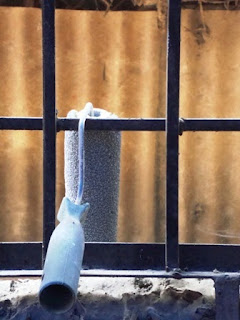Travelling to Pune always reminds me of the time when my parents lived at CME and I used to take the train every other weekend from Mumbai to meet them. Being a cash poor and time rich student, I usually hopped on to any available empty train and spent most of the ride admiring the scenery or writing furiously in my notebook. Some of those pieces made it into the student magazine but most are lost, their vanishing a little unnoticed and perhaps justifiably unsung. The more common route these days is the Expressway and though the buses are quick and efficient, something of the romance of the trip is lost, especially the arrival into Karjat and the climb and descent from Khandala. A mid travel eating spot remains and though this centralised facility is a little different from the quick grabs from a station or unscheduled stop, the eats on offer remain somewhat similar. I took a few quick snaps on the break.
The staples of train travel - nuts, berries, fruits are of course still around.
As is the vada pav and the omelette pav. The Karjat sellers would be swamped but now things are a lot more leisurely. The meal I bought reminded me of a line from English August, where an urban type becomes a babu in rural Maharashtra. Spying a market meal, he thinks of it with a cartoon bubble - Hullo, my name is cholera, what's yours? I survived my meal just like August.
What I don't remember is the Science at Home. I was intrigued by this - who runs it? - but the bus left before I could ask questions.
In Pune, I caught up with friends and family. We went to Kirkee, which is much changed. Mid way through my trip we took a leisurely drive through the cantonment. Which has also changed but the old bungalows survive. I am not overly sentimental about Army life but there is something of an ease in being among things that formed part of a life already left behind.
Visiting old friends in Pune also reminded me of the Marathi Natyasangeet tapes that used to play in our hostel rooms. There was one particular song I liked and never found in a tape - of course it is on youtube.
Visiting old friends in Pune also reminded me of the Marathi Natyasangeet tapes that used to play in our hostel rooms. There was one particular song I liked and never found in a tape - of course it is on youtube.

































